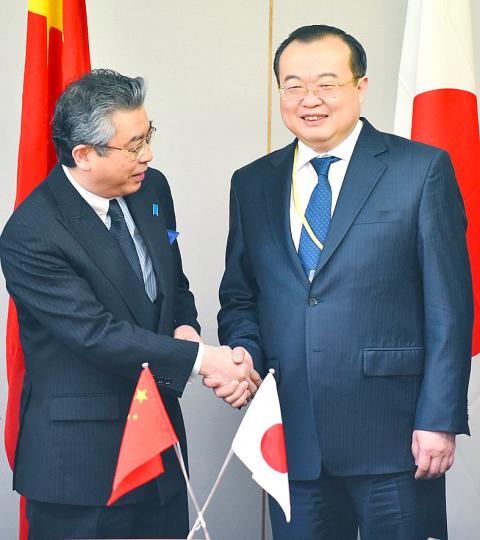Japan and China held security talks yesterday after a four-year hiatus because of simmering territorial tensions, in a meeting expected to touch on the flashpoint issue of maritime crisis management, officials and reports said.
The first such dialogue between the two Asian rivals since January 2011 was held at the Japanese Ministry of Foreign Affairs in Tokyo, a government official said, in the latest sign of a hastening thaw in once-frozen relations.
The talks involved top officials from each nation’s foreign and defense ministries, including Japanese Deputy Minister of Foreign Affairs Shinsuke Sugiyama and Chinese Assistant Minister of Foreign Affairs Liu Jianchao (劉建超).

Photo: AFP
Tokyo and Beijing are at loggerheads over the sovereignty of uninhabited islands in the East China Sea, which Japan administers as the Senkakus, but which Taiwan and China claim as the Diaoyutai Islands (釣魚台).
Relations soured in 2012 when the Japanese government angered China by nationalizing three of the five islands and Beijing had since refused most high-level talks with Tokyo, as ships and planes from both sides regularly sparred in the East China Sea.
Some observers had warned that the regular presence of military or paramilitary vessels from two of the region’s biggest powers risked sliding into conflict through error or a wayward local commander, but the two sides broke the ice in November last year when Japanese Prime Minister Shinzo Abe and Chinese President Xi Jinping (習近平) exchanged a frosty handshake on the sidelines of an APEC forum.
“Our country sees [the dialogue] as important as it is expected to improve mutual trust between Japan and China in the field of security,” Japanese Chief Cabinet Secretary Yoshihide Suga told reporters. “Through this dialogue, we want to foster a sense of trust between the two countries by exchanging views frankly and honestly on security policies, defense policies and the regional situation.”
Liu told the meeting that Beijing hoped to develop ties with Tokyo in the spirit of “taking history as a mirror and looking forward to the future,” Xinhua news agency said.
The comment reflects Beijing’s persistent theme of Japan’s need to face up to its actions in World War II.
Japan was expected to ask China to go ahead with stalled plans to launch a maritime crisis-management mechanism as soon as possible, Jiji Press said.
Tokyo is also expected to ask Beijing to make its growing defense spending more transparent and explain the reasons behind its military expansion, it said.
Beijing was likely to want to talk about moves by Abe to relax restrictions on the Japanese military to allow it to come to the aid of allies under attack, it added.

AIR SUPPORT: The Ministry of National Defense thanked the US for the delivery, adding that it was an indicator of the White House’s commitment to the Taiwan Relations Act Deputy Minister of National Defense Po Horng-huei (柏鴻輝) and Representative to the US Alexander Yui on Friday attended a delivery ceremony for the first of Taiwan’s long-awaited 66 F-16C/D Block 70 jets at a Lockheed Martin Corp factory in Greenville, South Carolina. “We are so proud to be the global home of the F-16 and to support Taiwan’s air defense capabilities,” US Representative William Timmons wrote on X, alongside a photograph of Taiwanese and US officials at the event. The F-16C/D Block 70 jets Taiwan ordered have the same capabilities as aircraft that had been upgraded to F-16Vs. The batch of Lockheed Martin

US President Donald Trump yesterday announced sweeping "reciprocal tariffs" on US trading partners, including a 32 percent tax on goods from Taiwan that is set to take effect on Wednesday. At a Rose Garden event, Trump declared a 10 percent baseline tax on imports from all countries, with the White House saying it would take effect on Saturday. Countries with larger trade surpluses with the US would face higher duties beginning on Wednesday, including Taiwan (32 percent), China (34 percent), Japan (24 percent), South Korea (25 percent), Vietnam (46 percent) and Thailand (36 percent). Canada and Mexico, the two largest US trading

GRIDLOCK: The National Fire Agency’s Special Search and Rescue team is on standby to travel to the countries to help out with the rescue effort A powerful earthquake rocked Myanmar and neighboring Thailand yesterday, killing at least three people in Bangkok and burying dozens when a high-rise building under construction collapsed. Footage shared on social media from Myanmar’s second-largest city showed widespread destruction, raising fears that many were trapped under the rubble or killed. The magnitude 7.7 earthquake, with an epicenter near Mandalay in Myanmar, struck at midday and was followed by a strong magnitude 6.4 aftershock. The extent of death, injury and destruction — especially in Myanmar, which is embroiled in a civil war and where information is tightly controlled at the best of times —

China's military today said it began joint army, navy and rocket force exercises around Taiwan to "serve as a stern warning and powerful deterrent against Taiwanese independence," calling President William Lai (賴清德) a "parasite." The exercises come after Lai called Beijing a "foreign hostile force" last month. More than 10 Chinese military ships approached close to Taiwan's 24 nautical mile (44.4km) contiguous zone this morning and Taiwan sent its own warships to respond, two senior Taiwanese officials said. Taiwan has not yet detected any live fire by the Chinese military so far, one of the officials said. The drills took place after US Secretary